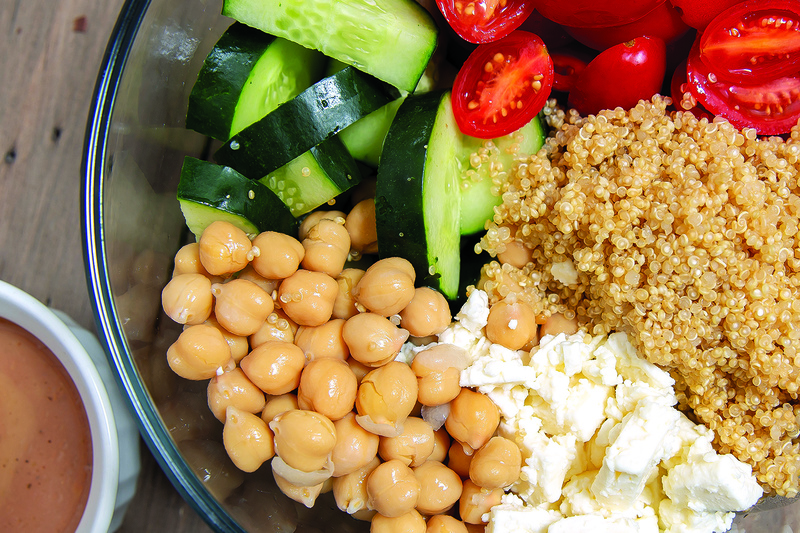News
Plant-Based Power Bowl

Plant-based proteins offer something that animal products do not — beneficial plant compounds called phytonutrients. Phytonutrients are naturally occurring chemicals that often have antioxidant and antiinflammatory properties.
When consumed regularly, phytonutrients may help boost your overall health and prevent chronic disease. This quick and simple recipe contains chickpeas and quinoa — two plants that offer 8 to 13 grams of protein per cup, plus complex carbohydrates. To add flavor and balance, the dressing provides a dose of healthy fats.
Ingredients:
- 1 cup grape tomatoes, sliced
- 1 cup cucumber, sliced
- 1 cup canned chickpeas, drained
- ½ cup cooked quinoa
- ¼ cup feta cheese
- 2 tbsp Italian salad dressing
- Toss all ingredients in a bowl and enjoy!
- Protein boost: Add 4 ounces of lean poultry or fish, such as chicken breast or canned tuna.
- No added sugar: Make your own dressing using 1 tbsp extra virgin olive oil, ½ tbsp red wine vinegar, ¼ tsp Italian seasoning, a squeeze of fresh lemon and salt and pepper to taste.
More News
-
New!
More

The Midnight Bathroom Run: Why It Happens and How to Stop It
If you’re waking up at night to pee, you’re not alone, and you’re not doomed to a lifetime of restless sleep. Nocturia, or nighttime urination, is one of the most common and under-discussed sleep disruptors, affecting both men and women, especially as we age. But according to Dr. Joseph Dall’Era, a urologist at Vail Health, it’s not something you have to simply “live with.” “Usually, we imply nocturia if the urge to urinate is what actually wakes people up,” Dall’Era explains. “For most people, getting up once a night isn’t a big deal. But if it starts to interfere with sleep quality or you notice a change in how often it’s happening, that’s worth a closer look.”
-
New!
More

Healing from the Inside Out: How Nutrition Supports Recovery
Whether you are recovering from a minor scrape, a sports injury or major surgery, what you eat can significantly impact how well, and how quickly, you heal. While your body is working hard to repair tissue, fight infection and restore strength, it needs the right fuel to do its job. Below are some simple ways to incorporate key nutrients into your diet to help your body repair itself.
-
New!
More

Supplements, Simplified
Nutrition noise is loud. From gym bros preaching powders to influencers pushing miracle capsules, it’s hard to know what your body really needs and what’s just hype. The truth? Supplements aren’t a one-size-fits-all, and they’re not meant to replace real food.





